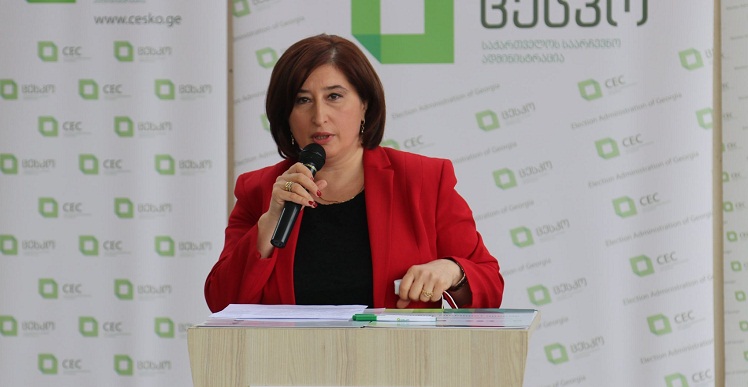Georgia’s Central Election Commission: ISFED’s data on imbalance in summaries of election results incorrect

The Georgian Central Election Commission says there was no imbalance between ballots cast and signatures of registered votes in eight per cent of election districts. Photo: CEC.
The Georgian Central Election Commission (CEC) says that the data of the International Society for Fair Elections and Democracy (ISFED) NGO which shows an imbalance between ballots cast and signatures of registered votes in eight per cent of election districts, is incorrect.
The CEC says that the imbalance was detected in only 19 summaries of election results of 3,657 polling stations which makes for 0.52 per cent of election districts.
The CEC states that ‘it is unclear’ why ISFED says in its November 1 and December 11 documents on the parallel vote count that there was an imbalance between ballots cast and signatures of registered votes in eight per cent of election districts.
The data released by ISFED is absolutely different from official statistics. It is possible that ISFED did not take corrected summaries of election results into account which are an integral part of summaries of election results,” CEC said, adding that they are ready to cooperate with ISFED and all interested parties regarding the issue.
Earlier this week the ruling Georgian Dream party asked ISFED to present the list of the eight per cent of election districts where, per the NGO, the ballots cast outnumber the signatures of registered voters.
 The ruling party says that ISFED's data is incorrect. Photo: Georgian Dream press office.
The ruling party says that ISFED's data is incorrect. Photo: Georgian Dream press office.
ISFED admitted to a mistake in its data of the parallel vote count last weekend, while the data has been used so far by opposition parties ‘as evidence that the ‘elections were fabricated’.
- ISFED adjusts October 31 vote count results after detecting ‘technical fault’ in calculation formula
Following an internal audit ISFED adjusted the figures and said that the Georgian Dream ruling party received 47.6 per cent of votes instead of the the initially reported 45.8 per cent in the parallel vote count, while the United National Movement/Strength in Unity election bloc received 27. 4 per cent of votes instead of 26.4 per cent.
However, the NGO repeated that there was an imbalance in the eight per cent of summaries of election results.
The ruling party says that like the initial data of the parallel vote count, ISFED’s statement on the imbalance between ballot papers and registered voters, is also incorrect.
 Tweet
Tweet  Share
Share